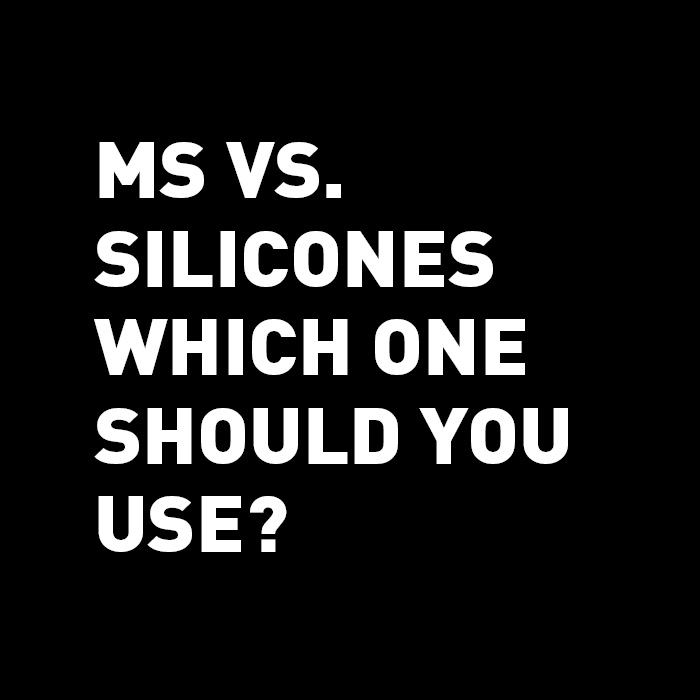![]()
WHICH ONE SHOULD YOU USE?
Silicones and MS polymers are widely used as sealants and adhesives in the construction industry.
Silicone is made from silicone polymers whereas MS polymers, also known as hybrid polymers, combine the best properties of silicone and polyurethane without being the same as either substance. Each has distinct properties, applications and advantages – so here’s a breakdown of the key differences to help you choose the right product for the task at hand.

Structure |
|
SILICONES |
MS POLYMERS |
| Are highly flexible and resistant to environmental factors. They cure by reacting with moisture in the air, forming a rubbery, flexible material. Importantly, silicones require a dry surface and cannot be painted. | Offer a balance between flexibility and strength. MS polymers have a thicker viscosity meaning they are less likely to slump. They also cure with moisture, but the resulting bond often tends to be more rigid than silicone. Unlike its rival, MS polymers can be applied to damp surfaces and can be painted. |

Adhesion & Bonding Strength |
|
SILICONES |
MS POLYMERS |
| Offer long-term durability but their adhesive strength is typically lower than MS polymers. They bond well to non-porous surfaces like glass, metal and ceramics but may require primers for bonding to porous materials like wood or concrete. | Are known for their strong adhesive properties. They can effectively bond to a wide range of materials, including porous and non-porous surfaces, without the need for primers unless in a stress-loaded application. This makes them highly versatile in situations where strong bonding is crucial. |

Elasticity & Flexibility |
|
SILICONES |
MS POLYMERS |
| Are highly elastic and can accommodate significant movement in joints and seams without losing their seal. This makes them ideal for use in areas subject to frequent expansion and contraction, such as around windows or in building facades. | Some offer the same degree of flexibility as the best facade silicones but many MS polymers are less elastic. However, they provide a stronger, more durable bond that can withstand higher mechanical loads, making them ideal when both flexibility and strength are required. |

Resistance to Environmental Factors |
|
SILICONES |
MS POLYMERS |
| Are highly resistant to extreme temperatures, UV radiation and moisture. They maintain these properties over a wide temperature range and do not degrade when exposed to sunlight, making them ideal for outdoor use. | Offer good resistance to environmental factors but MS polymer adhesives are typically not as resistant to UV radiation as silicones. Although when used for facade and window applications, they are on par with the UV resistance that silicones offer. They also excel in applications where chemical resistance and mechanical durability are important such as in industrial settings. |

Curing Time & Process |
|
SILICONES |
MS POLYMERS |
| Generally, cure more slowly than MS polymers, taking up to several days to set to full adhesive strength depending on the product and environmental conditions. The curing process is moisture-dependent, so high humidity can speed up this process. | Cure faster than silicones and achieve a greater bond strength relatively quickly. This makes them advantageous in applications where time is of the essence. |

Ideal Use |
|
SILICONES |
MS POLYMERS |
| Are especially useful in areas where movement is expected as they remain flexible over time without cracking. They are often used to seal gaps, joints and seams around windows, doors, sinks, bathtubs and in other areas where water resistance is crucial. Additionally, they can adhere to a wide variety of surfaces including glass, metal, plastic and ceramic that does not require painting. | Are preferred when strong bonding and quick curing are needed. They are used in construction (to bond and seal facades, windows and doors), automotive (as a bonding agent in bodywork and windshields), and industrial applications (such as manufacturing processes) where a durable and strong seal is required. |
So to conclude…
Both silicones and MS polymers have their unique strengths, making them suitable for different applications. Silicones are ideal for environments requiring high flexibility, temperature resistance, and durability, while MS polymers provide strong adhesion, have quicker curing times, can be painted, and are versatile across a wide range of materials.
By understanding these subtle differences, Soudal hopes you can make an informed decision to choose the right product for your specific job. If you need any further help or advice, feel free to get in touch with a Soudal expert by emailing info@soudal.co.nz.

